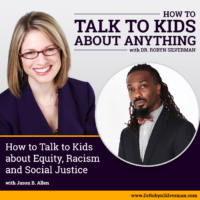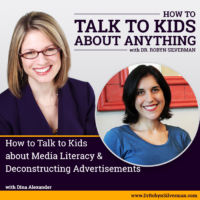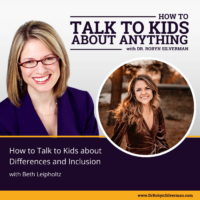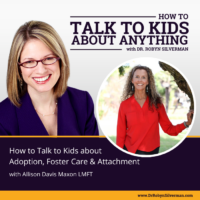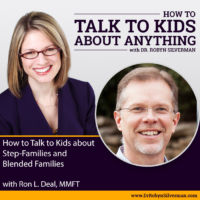Podcast: Play in new window | Download
Subscribe: Apple Podcasts | RSS | More
How to Talk to Kids about Race and Racism
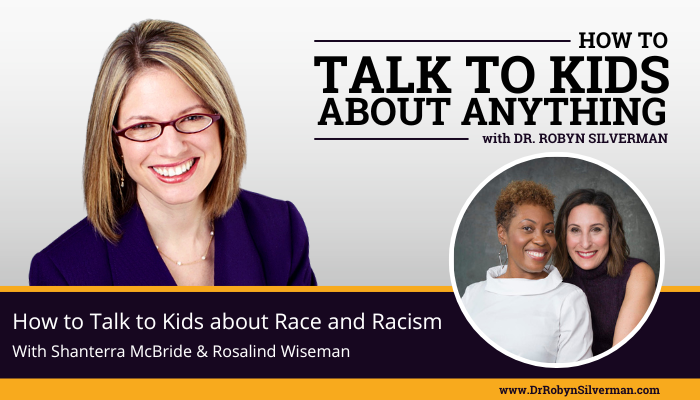
This podcast will focus on talking to our kids about being brace and having uncomfortable conversations about race and racism. Don’t let the discomfort get in the way! Dr. Robyn Silverman interviews coauthors, Shanterra McBride and Rosalind Wiseman, about their book, Courageous Discomfort.
Guest Experts: Shanterra McBride & Rosanlind Wiseman
Talking about race and racism isn’t easy. There are a lot of questions that we may not know how to answer while in the moment and many situations that we may not know how to handle when we are in them. We also may be confused about how to raise children who are true allies and who are willing to step up, have tough conversations themselves and not just do what’s right in the moment but also what could be helpful in the long run as we strive for lifelong relationships and lifechanging opportunities for growth. How do we ensure we do better and embrace a willingness to engage in courageous discomfort as we dive into our questions about race and racism? For this, we have 2 amazing women on today, Shanterra McBride and Rosalind Wiseman.
Bio
Shanterra McBride is a Texas-based author, preacher, speaker, and teacher. She is the founder of Marvelous University, a social enterprise that offers life coaching and success planning for young people, specializing in leadership development for girls and young women. Shanterra was awarded the Profiles in Leadership Award from SMU for having made a significant impact on the quality of life of girls and women all over the country. She is the author of Love Your Jiggle: The Girls’ Guide to Being Marvelous, an inspirational book for girls ages 11 to 17. And she is the coauthor of Courageous Discomfort Conversations about Race and Racism with Rosalind Wiseman.
Rosalind Wiseman is a Colorado-based speaker and bestselling author, perhaps best known For Queen Bees and Wannabes: Helping You daughter Survive Cliques, Gossip, Boyfriends, And the New Realities of Girl World, the basis for the hit movie and Broadway musical Mean Girls. She has authored several other parenting books, including Masterminds & Wingmen and the Owning Up Curriculum. Rosalind is a regular contributor to National Public Radio, the New York Times, the Today Show, and other national media- and has been on our podcast twice before talking about bullying and social aggression as well as getting granular in touch conversations.
Important Messages:
- What do you say when something tragic happens in the black community, like someone was killed due to racism? “I know you’re seeing, and it absolutely sucks.”
- Have to realize— that sending flowers isn’t the same as listening. It can’t be; “I’m willing to send you flowers, but I don’t want to come to the house. I don’t want to sit in the sadness, in the grief, in the, I just want to drop off the casserole. I don’t want to come in.”
- Often, it’s not about reaching out but doing the work yourself. Rosalind gives example of woman who found out her predecessors were slave owners. This is not about contacting a prestigious black professor to find out next steps- but to do the work in advance yourself since there are so many people already doing this work that you can research.
- What should we say instead of “we don’t see color” or teaching a child “not to see color.” Instead, aim for the baseline or wanting kids to be accepting and kind and open-minded and definitely not racist.
- Not seeing color says, “I see you and I’m uncomfortable with what I’m seeing right here so I’m not going to focus on that.”
- Young people are not color blind. They see color. We want them to see color because we don’t want them to erase a part of someone’s identity.
- Sometimes we do need to say, “you know this person was killed/harmed because of the color of their skin? You can’t be colorblind if the issue is about how someone is being treated because of the color of their skin.
- It matters most what the black people think about how they want to be seen.
- What out for microaggressions. “You are so well spoken!” That can come off as “I didn’t think you’d be well spoken because you’re black.” What if you said that to someone else? “You are so well-spoken!” You can hear that it’s really not coming out in a positive way.”
- Instead, if you want to make a point to somebody that they’ve done a great job in articulating something, just be specific about what they’ve said that meant something to you.
- It’s important to ask ourselves, “Why did this surprise me about this person?” Where does that perception come from that a black person shouldn’t be well-spoken or some other prejudice?
- When is it NOT race/racism? (example of white boy flipping off black boy in school—is this racism?)
- As parents and educators, we need to maintain our emotional equilibrium. Things will push our buttons. Parenting can get us like really up and down. I think the most important thing is also tracking your own first response to a situation that is being labeled as racist. Don’t ask a million questions. Don’t start making assumptions. Don’t call the school. Ask, why do you perceive that?”
- In the situation where the boys were flipping each other off—could mean a lot of things! Were they mad at each other? Saying good bye? Being silly?
- What does allyship look like in a school culture?
- “My kid wouldn’t ever do that.” I want parents to make the assumption that their children have seen racist comments on their feed or in their group chat, that they have participated in some way in those racist group chats jokes, whatever that their children have are confused about using the n word for example, because they have white friends who have said, it’s fine, we listen to it on the music, or this is j or it’s a way to prove that they’re sort of in or something like that. I want parents to assume that their children are in the mix of racism and that it is complicated and that our children, I’m including mine in this, our children sometimes do things that we, that we are like, no way, there’s no way our kid would do that. (Rosalind)
- When a friend of your child says something racist in the car; hey, that you’re saying right now, love you, you’re in my house, you eat my food, and because of that I’m holding you to a standard, not a high standard. By the way, let’s not say that saying anti, like being anti-racist is like a high standard. It is a decency, dignity standard of this is not happening. And and I don’t care if you hear it among other families, I don’t care. And you know, cuz I love you. You’re my kid’s friend, this is not happening. This is the standard I hold you to.” So I have control over that. And I think we absolutely have the responsibility to say that regardless if our children think that’s embarrassing because we should, they, they’re, it is fine for us to do things that are embarrassing when we are showing our values about upholding other people’s dignity. So that’s, it’s fine if our kid kids are embarrassed about that.
- Kids often want to remain silent when they hear racism. “This is the conversations I’ve had with my own kids where they have had to learn, but they have been silent when I’ve wanted them to speak out. That I live in Colorado, there’s a lot of racism against Mexicans here. A lot of jokes, a lot of horrible things that I, that were really hard that for me to learn about. I wasn’t raised here. So when my kids say to me, yeah, this thing happened, and I say, well, what are you going to say? What are you going to do? And they say, I don’t want to do anything. I don’t want to say anything. I don’t want to do it.
- When a 13 year old says something racist: “Racist remarks at age 13 doesn’t make them racist, it makes them 13. It doesn’t make them bad people, it doesn’t make you a bad parent. We are on a process of handling difficult things, which means we’ve got to give each other some grace along the way. When kids who are 13 say something racist and it’s caught on social media, god forbid, and then the whole community says like, oh my gosh, like what a terrible child and what terrible parents everything. That is not an opportunity. That is not a situation in which people who have made this mistake are given the space to be able to do better. They just understandably get more defensive and more hunkered down. Hold he kids accountable but do it in a way that doesn’t create immense amounts of shame and feeling like he doesn’t belong in his community, because we’ve got to be able to do that work. We gang up on people so quickly. Yes. And it, it all, the only thing it does is makes us feel like temporarily self-righteous. And then, you know, some’s going to come around to us one day.
- What if an old relative says racist remarks, “back in my day…” “Grandpa, that’s true. Back in your day…we are in a new day, you know, and I am teaching my children this, or I’m teaching my children to treat everyone with dignity.” Don’t need to shame!
- When someone is trying to start an argument at the table: “I do want to have this conversation, but not right now because I don’t want to take away from the work that this person did, put this food on the table. When is a good time to continue this discussion?
- You can debrief with your child; “I want you to respect the position of your grandfather. It’s really important to me that you respect those kinds of positions. But when people within those positions are taking away the dignity of other people, you don’t have to respect those actions.
- I would meet people where they are as they are trying keep being comfortable. You know, keep being, and I think we, we run from discomfort. We run from it. We want everything in our world to be easy– it’s not, that’s, that’s not life. (Not everything is yoga pants!!)
- Read the book, Courageous Discomfort.
Notable Quotables:
- “Allyship can be uncomfortable. It’s not, ‘I’m willing to send you flowers but I don’t want to sit in the sadness, in the grief. I just want to drop off a casserole- I don’t want to come in.”
- “When someone says , ‘I don’t see color,’ it says, ‘I see you and I’m uncomfortable with what I’m seeing so I’m not going to focus on that.’
- “Young people see color. They aren’t blind. We want them to see color because when they don’t, they erase a part of someone’s identity.”
- “As parents and educators, we need to maintain our emotional equilibrium— parenting can get us like really up and down. I think the most important thing is also tracking your own first response to a situation that is being labeled as racist. Don’t ask a million questions. Don’t start making assumptions. Don’t call the school. Ask, why do you perceive that?”
- “I think part of part of raising young people to want to be allies is meeting them where they are. They are still developing and understanding.”
- “Be who you want to be and be who you want your kids to see.”
- “Be easy on people and hard on ideas.”
- “Remember, people are trying.”
Be who you want your kids to see, says @ShanterraMcB with @culturesofdignity on the How to #TalktoKids about Anything. This is so important when teaching about race & racism!
Click To Tweet
Be easy on people and hard on ideas says Rosalind Wiseman @CulturesofDignity on #talkotkids podcast. Listen in as we discuss race & racism with Rosalind and @ShanterraMCb
Click To Tweet
Resources:
- www.CourageousDiscomfort.com
- www.ShanterraMcBride.com
- www.RosalindWiseman.com
- www.MarvelousUniversity.com
The post How to Talk to Kids about Race and Racism with Shanterra McBride and Rosalind Wiseman appeared first on drrobynsilverman.com.

